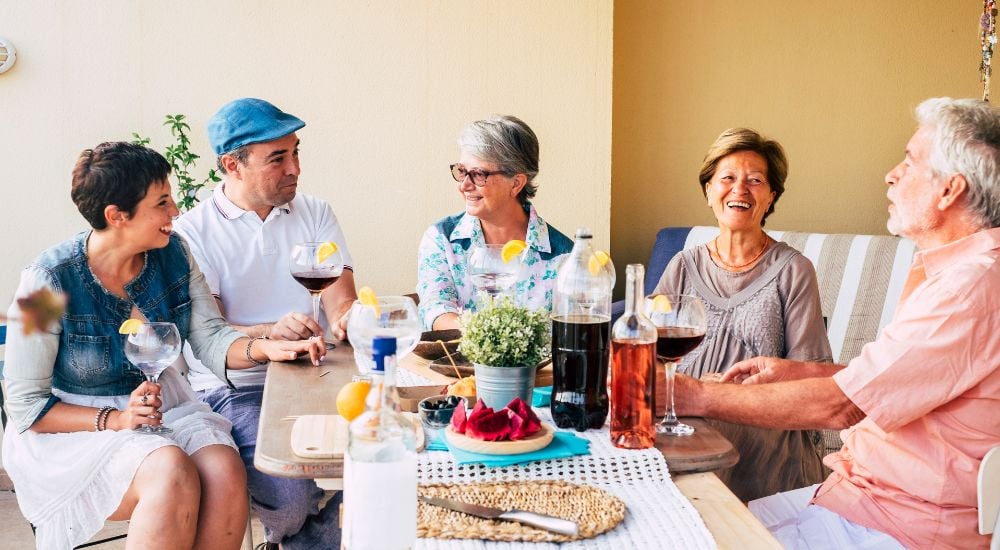So, we all know about the benefits of physical exercise during old age. However, do you know that keeping socially engaged is equally important for the mental health, too?
Studies have found that there is actually a correlation between social interaction and brain health. As one ages, being involved with others i.e. being socially engaged is strongly associated with better brain function, thus the ability to age healthily and strongly.
In fact, seniors who are socially engaged are found to be less likely to suffer from dementia or memory loss – the one most common illness that plaque many of our older adults.
How Does Being Socially Engaged Promote Healthy Aging?
1. Improved Emotional Health
The relationships we create with people and the connections we build with them have a significant impact on our emotional and mental health.
When seniors engage in activities with others who share the same passion and interests, they are more likely to be a part of positive interactions.
This could be from taking part in entertaining workshops or learning about their favourite hobby – it boosts their self-esteem and gives them a sense of assurance, thereby allowing them to have a more optimistic view of life.
When one is more positive, such emotional bonds will lead to a healthier lifestyle (and therefore, a healthier aging process).
2. Enhanced Cognitive Function
Participating in activities often require a good amount of concentration and focus.
When one concentrates on doing a particular activity, it helps keep the brain active and improves its working memory. Incidentally, staying mentally engaged as such improves the cognitive health in turn.
Naturally, diseases like dementia or memory loss will be prevented or delayed at the very least. Some common activities you can consider doing is chess, bridge, board games and even crafts.
3. Lower Risk of Health Issues
Do you think it’s pure coincidence that seniors with healthy levels of social engagement tend to live longer than those who don’t?
No, it’s because with social engagement, they get to improve their physical health which in turns lead to lower health risk. One example would be exercise. When you work out with a few friends, the session becomes more enjoyable and time passes more quickly. You may even look forward to it every time or at the very least, there will be fewer excuses for you to miss sessions. Your buddies would not let you off!
Incidentally, a lot of diseases can be prevented and one’s mobility, balance and flexibility will improve, too!
4. Sense of Belonging and Sense of Purpose
When seniors gather with people who share the same kind of interests and hobbies, they are able to cultivate new friendships and experience a renewed sense of belonging.
You see, one thing with decreased social interactions among seniors is due to disengagement from the society once they retire. The hustle and bustle that was once a daily staple is suddenly replaced with a slow-paced of calmness and relaxation. To some, this sudden transition may leave them feeling empty and worthless.
By reintroducing social connections into their lives, it gives them something to look forward to everyday. This gives a sense of purpose, which is one of the most important things we need in life to live healthily.
5. Increased Self-Care and Improved Sleep Quality
Seniors who participate in social engagement are more likely to take better care of themselves. This is due to the need to look presentable in front of peers and friends, an inherent human nature trait.
When one takes better care of themselves, they will develop a healthier state of mind. This leads to better sleep quality at night, as social interactions help seniors experience a sense of satisfaction. When one is able to eat, sleep and live well, naturally, one is able to age healthily and live a longer and more fulfilled life.
How to Keep Socially Engaged When You are Old
As you can see, social engagement allows seniors to stay both mentally and physically active, which brings about better aging too.
Sadly, it is observed that healthy social interactions are oftentimes slowed down (or non-existent) as people get older. This could be due to a variety of reasons but living alone or isolation is arguably the most common cause.
If this is you, do not let living alone stops you from getting socially active. It is not necessary that you have to always be outdoors – there are plenty of activities you can do at home too to get your dose of social interaction such as:
- Joining (or starting) a book club or discussion group
- Exchanging calls and letters
- Playing a favourite game online
- Learn how to go online and use social media tools
Of course, taking a class related to your hobby (knitting, carpentry, art etc.) or joining a walking, hiking or bird watching group will lead you to being physically active as well. Participate in sports if that is something you enjoy, or get involved in church, temple or other religious organisation. All these will give you that social engagement.
Even if you may not be as agile as before or you may have mobility issues, you can still stay socially engaged with the help of a personal or in-home carer. They will assist you in getting to your destination safely or they can help with domestic chores so that you can have more time for your friends.
In any case, they would make for a good company even if you are not as socially active. A person to accompany you to the market, have coffee with, do gardening and even go for walks at the park – probably one of the easiest and most direct first step to getting your social life back.
Conclusion
Everyone needs social engagement. While exercise and diet are key factors for optimal health, social connections have a tremendous impact on one’s overall wellness too.
So, take the initiative and stay connected to keep your brain healthy. Engage the help of caring and professional caregivers to connect with a community in your own way, so as to enjoy a greater quality of life in your golden years.



